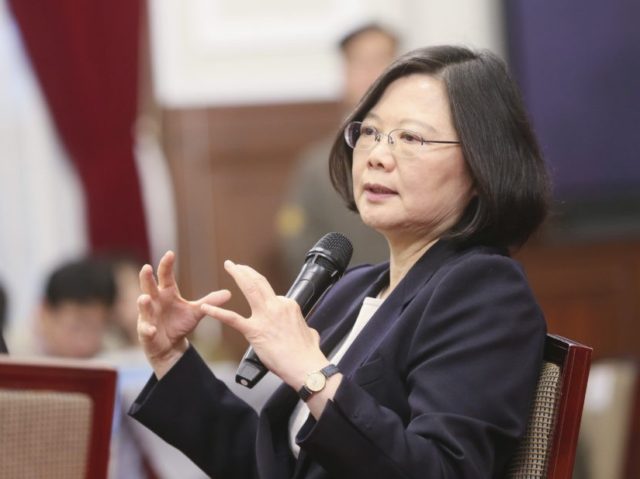Taiwanese President Tsai Ing-wen held a teleconference on Tuesday evening with several American think tanks at which she questioned the post-Cold War belief that the world is moving inexorably toward limited representative government.
“One thing that we have learned from the previous century is that the forward march of democracy is not a given,” she warned, offering Taiwan’s partnership in a pitched battle against authoritarianism.
The conference was sponsored by the Center for Strategic and International Studies, the Brookings Institution, and the Wilson Center, and was moderated by Ambassador Richard Armitage. The occasion was the upcoming 40th anniversary of the Taiwan Relations Act, which Tsai credited as a crucial step toward helping Taiwan “reject coercion” from China.
“By insisting on language that assures Taiwan’s security, Congress made sure that Taiwan would survive its darkest hour, and have the opportunity to transform itself into the free society and robust democracy we are today,” she said.
As in several other recent speeches, Tsai stressed the importance of the new arms sales Taiwan has requested from the United States to strengthen her country’s defenses in response to China’s military buildup. Her remarks suggested a Chinese assault on Taiwan could be a watershed moment that could inspire other acts of aggression and domination at a time when the “tide of authoritarianism” is rising around the world.
Tsai noted the Taiwan Relations Act also included a commitment to protect Taiwan against economic warfare and diplomatic isolation, the very same instruments China is employing to coerce Taiwan without attempting to conquer it outright.
“China has engaged in a relentless campaign to deny our right to participate in international affairs,” she said. “They don’t do this because it is a DPP [Democratic Progressive Party] administration, or because we don’t recognize the 1992 consensus. They do it, because they genuinely believe that the people of Taiwan don’t have an independent right to participate in global affairs.”
Tsai called for a “bilateral trade agreement with the United States” to take the already flourishing economic relationship between the two nations to an even higher level.
“We have the potential to work together in crafting an agreement that is based on our values and ideals, which can be used as a model for the rest of the Indo-Pacific region,” she said.
Tsai spoke proudly of joint efforts with the United States to promote religious freedom, drawing a strong implied contrast with China’s increasingly brutal crackdown on religion as a subversive force.
“Last month, Taiwan and the US co-hosted a Dialogue on Securing Religious Freedom in the Indo-Pacific Region, to make a stand, as religious freedom is being threatened around the world. We want to safeguard the religious freedom of all peoples because no one deserves to be punished or ‘re-educated’ for his or her own faith,” she said in a pointed jab at China’s massive re-education camps for Muslims.
The United States and Taiwan partnered to establish the Indo-Pacific Democratic Governance Consultations (IPDGC) in March, an initiative meant to foster cooperation between democracies in the region without deliberately antagonizing Beijing. The organization hopes to restore much of the diplomatic support China has methodically attacked and destroyed during Tsai’s presidency.
The IPDGC was founded with a commitment to the very same rights Tsai celebrated in her Tuesday speech: self-determination, economic liberty, and religious freedom. Its strategy is to hold Taiwan up as an example to Asian nations sorely tempted to accept Chinese money and control because they think authoritarianism is bearable, or because they fear Chinese domination is inevitable. Tsai is certainly correct about the importance of keeping Taiwan free as a vibrant refutation of both beliefs.

COMMENTS
Please let us know if you're having issues with commenting.